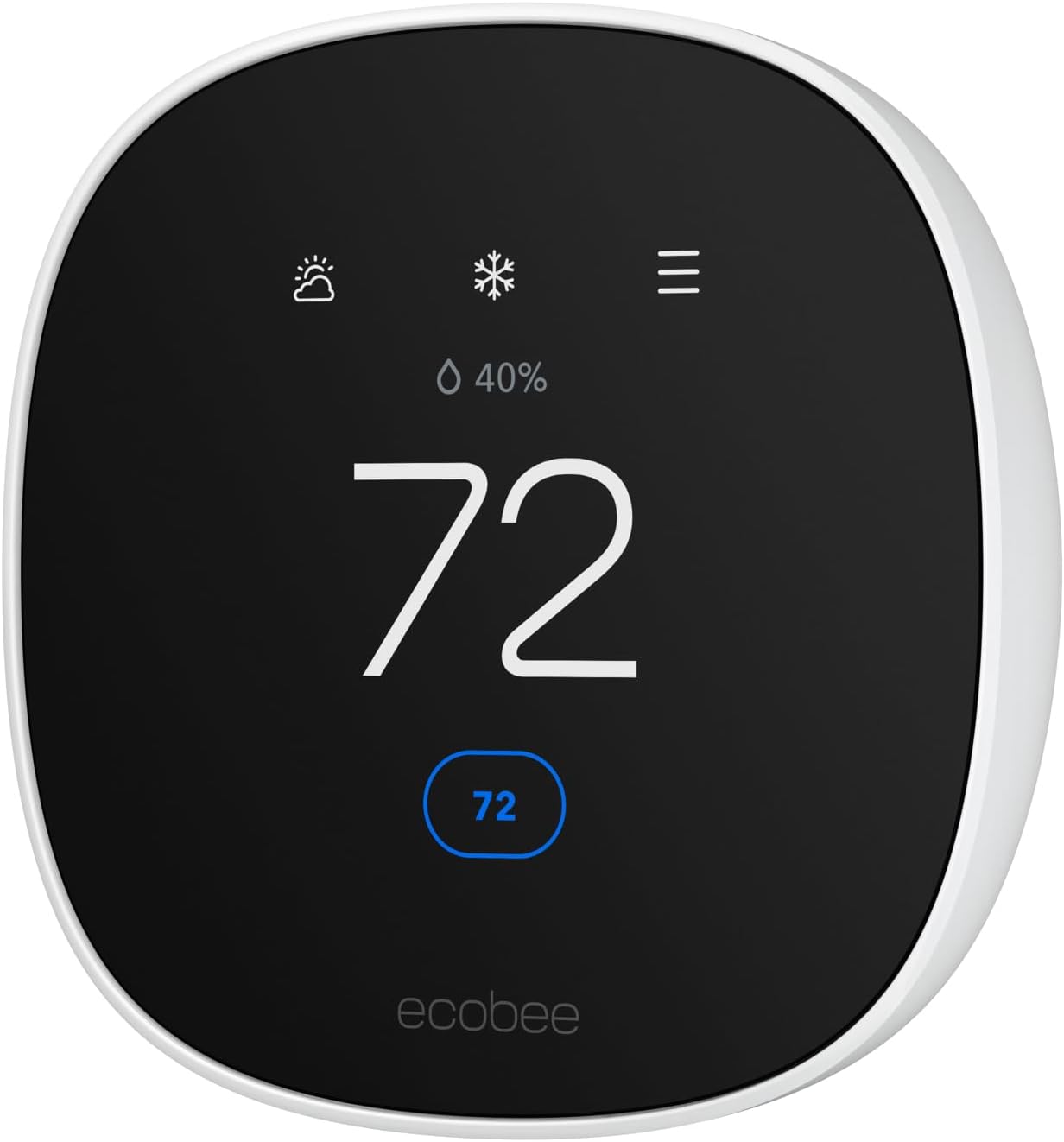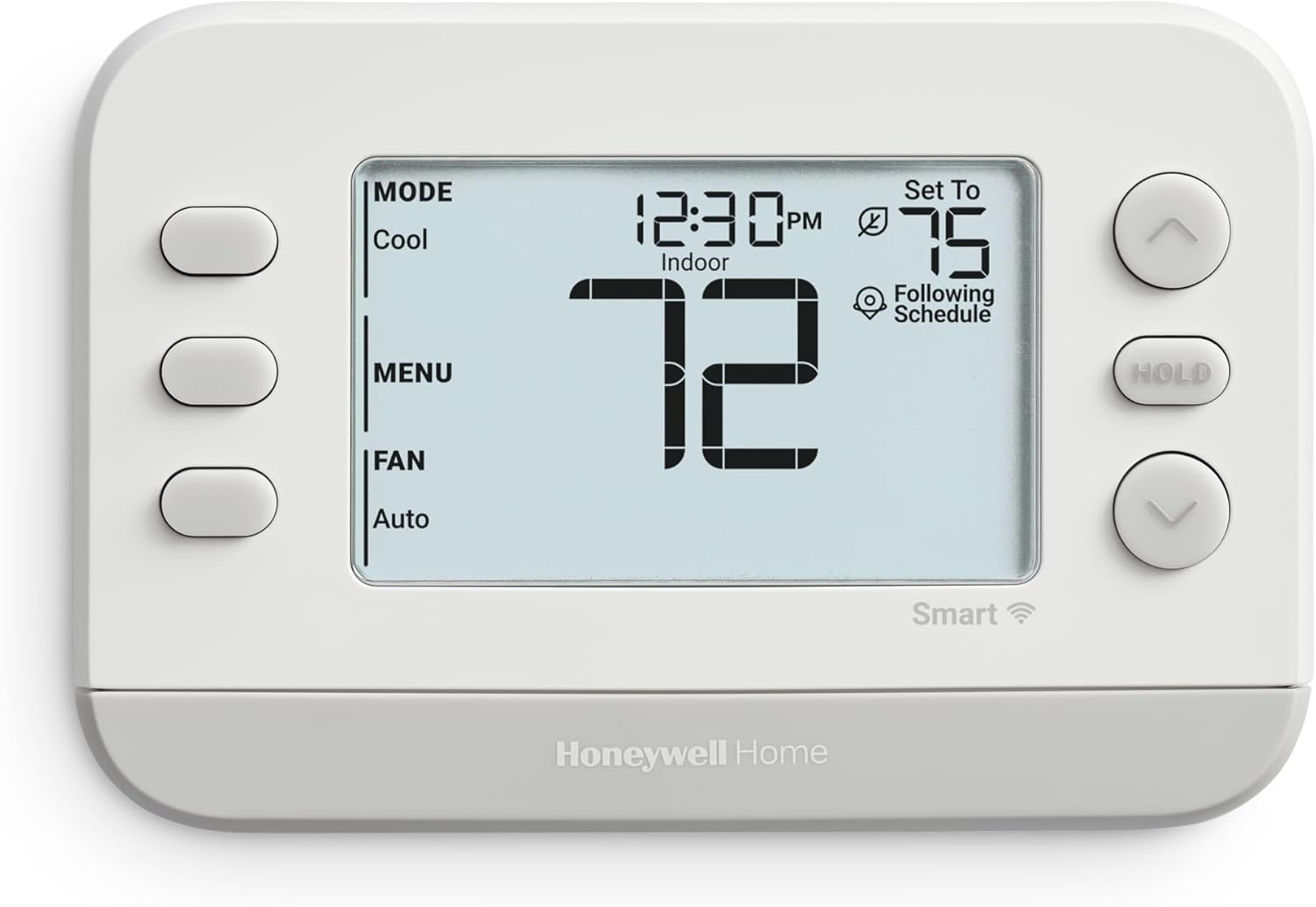Here’s an overview of the Best Smart Thermostats that we’ll explore today:
Smart thermostats have evolved from simple temperature schedulers to central control hubs for energy management and smart homes. They can save homeowners hundreds of dollars annually by optimizing heating and cooling, monitor system health, and integrate with ecosystems like Google Assistant, Apple HomeKit, Alexa, and Matter. This review tests five popular models across a price spectrum from budget to premium, focusing on compatibility, energy-saving features, installation ease, and user experience. Our methodology combines hands-on assessment of setup, app usability, voice integration, energy-saving tooling, and ongoing software updates. The products covered are representative of the major players in the space: Google, ecobee, meross, and Honeywell Home.
1. ecobee Smart Thermostat Essential – Energy Star Certified programmable Wi-Fi Thermostat – Works with Siri
- Brand: ecobee
- Manufacturer: ecobee
Overview: The ecobee Smart Thermostat Essential is an Energy Star certified, Wi-Fi enabled programmable thermostat designed to work with Siri, Alexa, and Google Assistant. Priced at $119.99, it emphasizes broad compatibility (85%+ of systems) and optional SmartSensor add-ons for room-level temperature and occupancy data. Notably, it supports a Power Extender Kit (PEK) for homes without a C-wire and can pair with Apple HomeKit as well as leading ecosystems, which broadens its appeal in multi-platform environments.
Performance and user experience: The Essential relies on ecobee’s scheduling and eco+ features to optimize energy use, including auto-away, time-of-use preheating/pre-cooling, and humidity awareness. The device offers a color touchscreen, robust mobile app, and software upgrades to extend longevity. While it’s compatible with most 24 VAC HVAC configurations, the lack of built-in power (battery powered) on the display side means installation dynamics depend on C-wire availability or the PEK. The optional SmartSensor (sold separately) enables room-level sensing, which can significantly improve comfort in larger homes or spaces with uneven heating and cooling. Installation is described as easy DIY, though some nests of wires may require careful wiring or a PEK accessory.
Pros
- Broad compatibility with 24 VAC systems (no C-wire required with PEK option)
- Energy-saving features: Auto-away, schedule assistant, eco+ humidity awareness
- Works with Apple HomeKit, Google Assistant, and Alexa
- ECObee SmartSensor support for focused room temperature and occupancy data
- Competitive price for feature-rich, multi-platform support
Cons
- Battery-powered thermostat display may feel less instantaneous compared to wired models
- Requires PEK for C-wire-less installations, adding cost and planning steps
- Some advanced features may require additional sensor purchases
2. Google Nest Thermostat – Smart Thermostat for Home – Programmable Wifi Thermostat – Snow
- Brand: Google
- Manufacturer: Google
Overview: The Google Nest Thermostat is a mid-range, ENERGY STAR certified smart thermostat at $101.99, designed for broad compatibility and strong Google ecosystem integration. It emphasizes energy savings via occupancy-based scheduling, remote control, and the Nest Renew program to prioritize cleaner energy use. It supports Matter and is compatible with Google Assistant, Alexa, and other Matter-certified devices, making it a good central hub for Google Assistant households.
Performance and user experience: Nest Thermostat is designed to work without a C-wire in most homes, though some configurations may still require it. It looks for energy savings opportunities in the Google Home app and provides HVAC monitoring alerts for maintenance. The Nest’s voice and app controls are straightforward, and the device benefits from a large user base and ongoing software updates. However, some advanced features like optimal energy pricing require engagement with Nest Renew and may depend on energy provider programs. The display and user interface are intentionally simple, which is a strength for many homeowners but can feel limiting for power users who want deeper customization.
Pros
- Strong Google ecosystem integration and Matter support
- Energy-saving features with occupancy-based scheduling and Nest Renew
- Easy installation without a C-wire in many setups
- Remote control and HVAC monitoring for preventative maintenance
- Compact design and straightforward app experience
Cons
- Limited advanced customization compared to some competitors
- Some systems may still require a C-wire or compatible power accessory
- Features like energy pricing depend on Nest Renew and provider compatibility
3. New! Honeywell Home Smart Thermostat
- Brand: Honeywell Home
- Manufacturer: Honeywell Home
Overview: The Honeywell Home Smart Thermostat (RTH2CWF) offers a budget-friendly entry into connected thermostats at $56.90. It is Matter Certified and compatible with major ecosystems (Alexa, Google Assistant, Apple HomeKit). The thermostat emphasizes flexible scheduling and humidity display, with a 2-year warranty and auto-away functionality. It supports a broad range of installations, including conventional and heat pump systems, but requires a C-wire in most cases, with a potential for a C-wire adapter if needed.
Performance and user experience: The Honeywell Home thermostat aims to deliver reliable, straightforward operation with energy program participation and rebates. Its Matter certification suggests strong compatibility with future-proof smart home devices. The device’s low price makes it attractive for renters or budget-conscious homeowners, though the lack of a rechargeable internal battery and reliance on a traditional wired setup can impact remote operation speed and resilience during Wi-Fi outages. The app and on-device controls are designed for ease of use, with clear display and schedule options, but fewer advanced sensing capabilities than higher-end models.
Pros
- Budget-friendly with solid core features
- Matter Certified and compatible with major ecosystems
- Flexible scheduling and humidity display
- Energy program participation and rebate opportunities
- 2-year warranty for peace of mind
Cons
- Typically requires a C-wire (adapter may be needed for some setups)
- Limited advanced features compared to premium models
- Display and controls are less premium than more expensive options
4. meross Smart Thermostat for Home
- Brand: meross
- Manufacturer: meross
Overview: The meross MTS300 smart thermostat is a versatile option at $69.99, emphasizing Matter compatibility and broad platform support (Alexa, Apple HomeKit, Google Assistant, SmartThings). It is designed for 24V HVAC systems and notes compatibility with many conventional setups but not suitable for electric baseboard heaters. It requires a C-wire and supports 2.4GHz Wi-Fi only, which can limit network options in some homes.
Performance and user experience: Meross focuses on DIY installation with a guided app setup and flexible scheduling. Its Matter integration enables local control across major ecosystems, which helps future-proof smart home integration. The device provides smart alerts for filter life and system status, which adds value for ongoing maintenance. While the UI is straightforward, some users may encounter compatibility caveats with more specialized systems, and the 2.4GHz requirement can be limiting in mixed-network environments. Installing with a C-wire adapter is an option if needed, but adds complexity.
Pros
- Matter compatibility across major ecosystems for local control
- Broad HVAC compatibility for 24V systems
- Smart alerts for maintenance and efficiency
- Reasonable price with strong feature set
- DIY-friendly installation
Cons
- Requires C-wire and 2.4GHz Wi-Fi only
- Not suitable for electric baseboard heaters
- Some setup nuance may require support contact
5. ecobee Smart Thermostat Enhanced – Programmable Wifi Thermostat – Works with Siri
- Brand: ecobee
- Manufacturer: ecobee
Overview: The ecobee Smart Thermostat Enhanced sits at $169.99 and represents the premium ecobee option with wired power and robust sensor capabilities. It includes Power Extender Kit for homes without a C-wire and supports a wide range of HVAC configurations (including 3H/2C heat pumps and boilers). It emphasizes humidity management, occupancy-aware scheduling, and the potential integration of SmartSensors for room-level data. This model is designed for users who want the most precise control, strongest ecosystem compatibility (HomeKit, Google Assistant, Alexa), and long-term software updates.
Performance and user experience: The Enhanced model hard-wires for reliability and offers an energy-saving profile with auto-adjustments based on occupancy and humidity. The inclusion of a Power Extender Kit eases installation in non-C-wire homes, while its compatibility with a broad set of HVAC equipment makes it a flexible choice for retrofits or new builds. The SmartSensor capability (sold separately) can further optimize comfort in high-traffic rooms. This model targets power users who want deep integration and the most consistent performance across diverse systems, albeit at a higher upfront cost.
Pros
- Highest level of ecobee integration and ecosystem compatibility
- Power Extender Kit enables non-C-wire installations
- Advanced energy-management features including humidity compensation
- Wide HVAC compatibility (including boilers and complex heat pumps)
- Strong build quality and long-term software support
Cons
- Premium price compared to other options
- Requires professional assessment for large or complex systems
- SmartSensor accessories add to total cost
Frequently Asked Questions
We’ve compiled answers to the most common questions about smart thermostatss to help you make an informed decision.
Conclusion
.
.
Final thoughts here.




